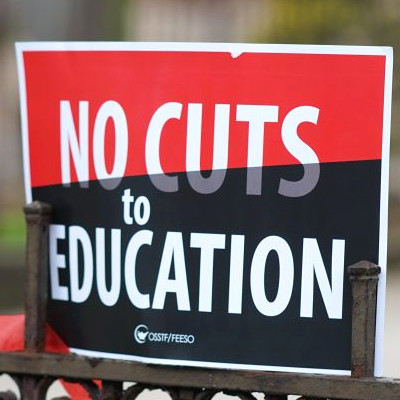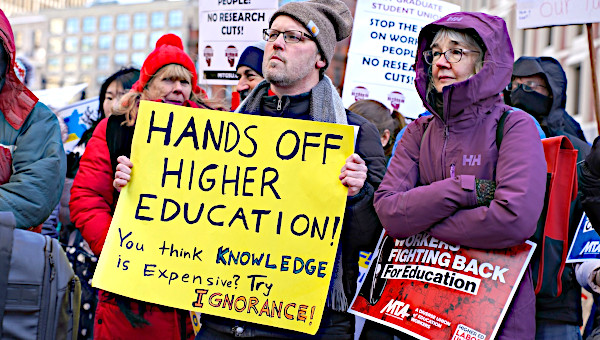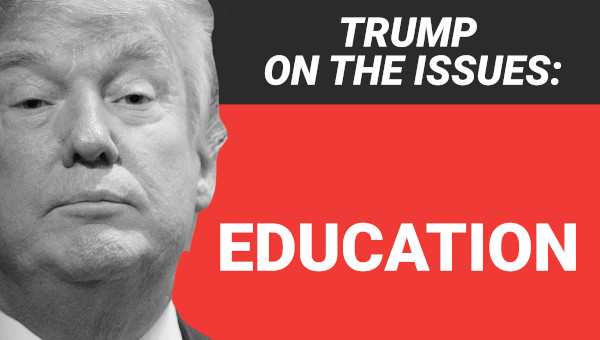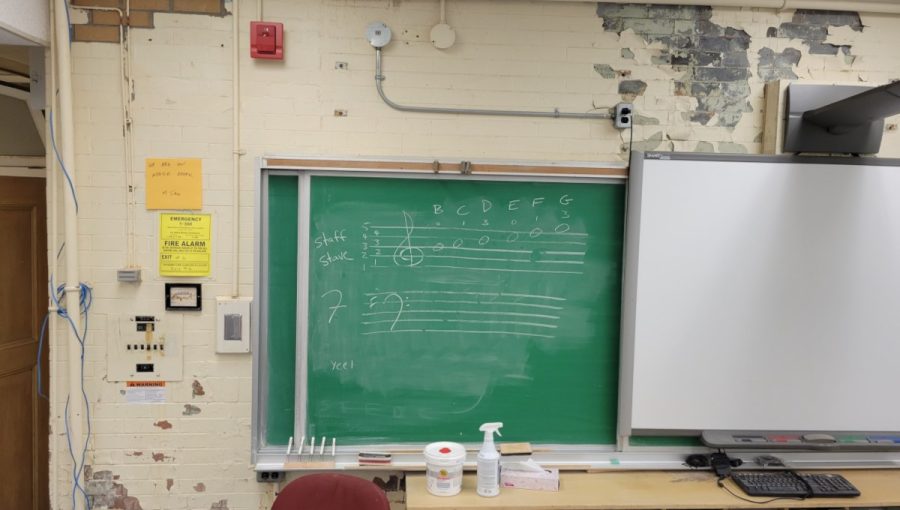Putting the Squeeze on Hope: Ford Government Hacks Toronto School Budget
One hundred and twenty kids are sitting in the Toronto District School Board’s (TDSB) Brookview Middle School auditorium listening to Mohamed Ahmed talk to them about possibility and hope. It’s happened this way for a few years as his group, Success Beyond Limits (SBL), makes its pitch to students who are considering high schools in the area like Westview Centennial from which SBL operates its program to guide young people through the tough years of secondary school. It’s a time – especially post-COVID, that’s fraught with tough personal decisions and the likely realization that opportunity is written with dollar signs when there is little money around.
Some of the students who’ve been through the SBL programme are there with Mr. Ahmed and they get to the main points right away. There’s a summer program for 110 kids that gives them a high school credit along with something to do when, as one student said, “I’d be home sleeping, doing nothing.” There’s breakfast and after that, there are classes at Osgoode Hall Law School at York University, an institution that is both near and far from so many of these kids living in the Jane and Finch Community. Mr. Ahmed says that these young people need to “envision themselves at university;” they shouldn’t have to lower their sights to one of Doug Ford’s opportunities to leave high school early and go into his new apprenticeship programme.
There are trips, great ones, as kids get to see the world outside their community, to experience what others might take for granted – a visit to Wet N’ Wild was a favourite.

Inclusion
These hundred or so kids are nurtured through high school and into early university. You can read more about Success Beyond Limits in a School article in our archive. It’s clear, in light of the violence that has beset schools across Toronto that there needs to be more programmes like this as part of school life – run by adults who know the communities across the city, helping kids negotiate potentially life-changing decisions. That idea came up over and over when I spoke with educators across the TDSB.
Someone has to help them see, for example, that there’s not a wall running down Finch Ave dividing kids living on the north side from those living on the south. This is crucial at a time when alliances are formed based on where you live – alliances that may lead to violence when someone figures they’ve been insulted on social media. One of the SBL students said that north and south side Finch kids would never have met were it not for the programme. SBL counsellors and others from programmes all across the city know how to throw out lines between young people caught in binds of misconception and help them navigate complicated relationships.
So there’s the hope – that school boards will be able to work with agencies across the city like Youth Outreach Workers, Toward Peace, YAAACE, For Youth Initiative and others under the umbrella of SafeTO – to improve relationships in schools that face outright violence, threats and lockdowns that impede their ability to educate the kids who attend them.
The Cost of Hope
Such hope costs money and the province could be sitting on a pile of it: by 2025-26 $22.6-billion in excess funds according to the Financial Accountability Office (FAO). Excess funds account for the difference between the government’s spending plan and the FAO’s projection for spending each year. The FAO argues that the $22.6-billion is money “not required to support the cost of current programs and announced commitments.” The FAO also projects actual budget surpluses by 2025-26 amounting to $10.6-billion compared to the government’s projection of $4.4-billion.
There’s a lot that could be done with this money to patch some of the holes in social services, housing, transit, cities, health and, naturally, education. But as the Tories approach their supporters in the 2026 election, they could also make them happy and use the money to pay down the provincial debt or keep taxes down.
Money, for sure, is not heading toward schools this year. Despite the province’s claims that it is spending more and more, it neglected to mention that inflation is rising faster than spending. As political economist, Ricardo Tranjan notes in The Monitor, the Consumer Price Index (CPI) went up by 16.9 percent between March 2018 and March 2023, Grants for Student Needs (GSNs), the money that goes directly to school boards, have dropped on average by $1200 per student if you take inflation into consideration.
What does this mean for the Toronto DSB? According to Mr. Tranjan, the board’s per-student grants increased by only 7.9 per cent- less than half the CPI increase: “the board will receive $1,110 less per student in 2023-24, in inflation-adjusted terms, compared to what it counted on in 2018-19. For a large board like the TDSB, this funding cut adds up to nearly $260-million a year in real dollars.”
That’s just the beginning. COVID-19 hit school boards hard and even though the Federal government kicked in $381-million for school safety, the province ended up spending only $232 million, leaving school boards to pick up a tab worth $304-million to keep their schools safe. That meant that the TDSB had to dig into its own reserves to the tune of about $69-million to cover the difference. It’s continued to do that over the past few years as expenses are higher than revenue, so now the pockets from which it draws money are emptying out. It is also working on a reduction plan for the $40.4-million deficit from 2022-23 which the Ministry of Education kindly allowed it to maintain provided it finds $42.7-million in cuts this year. Even as it does that, the TDSB is still in the hole for $15.1-million, money to find later. As it stands, the net deficit for 2023-24 stands at about $57.8-million.
There’s more. The Ministry provided $31.5-million for COVID relief at the TDSB in both 2021-22 and 2022-23. That money has come to an abrupt halt, perhaps because the Fordites believe that once the immediate threat of COVID has passed, there’s nothing more to worry about – no related mental health problems or anything arising from loss of work, housing, lack of food or just falling behind in school. That money is gone and with it, funding for 522 staff including:
- 65 teachers
- 38.5 vice-principals,
- 35 special education support staff,
- 200 lunchroom supervisors,
- 35 child and youth workers,
- 78.5 caretakers,
- 28.5 school office and clerical staff.
Forty safety monitors were initially removed from staff but later added back along with 16 centrally assigned social workers and 15 child and youth counsellors all paid for out of the Board’s dwindling budget. The same goes for 28 of the vice-principals across the system.
At a time when the TDSB is trying to cope with assaults and deaths in and near schools, regular lockdowns and attacks on staff, the Ford government turned off the money supply leaving the Board to figure who and what to cut from basic programmes. So, this is where the Board begins planning for 2023-24. It’s like wringing blood from a stone.
Begging for Funding
There have been many deputants to the Board over the past months begging for basic funds to keep schools running. Parent and teacher Anna Jessup urged trustees not to pass a budget with cuts in schools where absences go uncovered routinely, where lack of staff supervision leads to risk of injury and violence, especially in lunchrooms. She called for a “needs based budget” arising from an assessment of the risk to safety and programming in schools. Hillary Hall of Dovercourt School Advisory Council said cutting a part-time vice-principal, office staff and a special needs assistant would just result in more behaviour problems and lead to more suspensions.
Many parents spoke up about the cuts to aquatics programmes in schools that have had them for ages. The Board had decided that 8 of its 26 elementary school pools and 12 of its 39 secondary school pools could share staff and reduce costs, but then reversed the decision and added six aquatics instructors to keep full swimming programmes open. The $400,000 for that had to be found in the Board’s budget.
John Weatherup, president of CUPE Local 4400 told trustees that there needs to be proper staffing if special needs kids are to be included in regular programmes, adding that there is a lack of staff to deal with the safety plans meant to cover the nearly 1,300 violent incidents reported to him last year. Jason Persic, a teacher at Brown PS said of recent cuts, “special education has become a skeleton of what it used to be.” Other delegates explained how special ed and other teachers without a full classroom are used to cover the many staff absences for which supply teachers can’t be found.
It took two students from Jane and Finch, Aisha Hanna Macala and Shameera Husain, to lay out the big picture of what Ford government is dropping on the TDSB with its relentless cuts over 5 years now. Their analysis was striking. They spoke about public education and its benefits to communities in creating a more equitable and prosperous society. They explained how cuts to funding underscored by social and economic challenges would affect the marginalized youth of Jane and Finch: fewer extra-curricular activities, fewer school funds, more discipline meted out, more police calls – all of which maintain “the school to prison pipeline.” They asked for more, not fewer Child and Youth Counsellors, hall monitors, classes that aren’t cancelled due to lack of supply teachers and textbooks – really – textbooks. Like so many have said, they called for adults in schools who understand the community because when kids get into trouble “bad always has a back story.”
The TDSB Budget for 2023-34
Projected revenues for the TDSB in 2023-24 are $3.273-billion, most of which comes from Ministry Grant for Student Needs (GSNs) along with other Ministry grants and miscellaneous funds like fees charged to international students, use of facilities, lease and interest revenues. All of this goes toward staffing, keeping underfunded schools in some state of repair, transportation, administration and so on. But it’s not enough and the Board has to find $42.7-million to meet the Ministry’s bottom line of $15.1-million allowed for the Board’s deficit next year.
In the end, the TDSB will see staff losses including:
- 423 staff related to the loss of short term COVID funding (see above)
- Another 4 classroom teachers
- Another 73 lunchroom supervisors
- 17.5 professional and paraprofessional support staff
- 7.5 other classroom supports
- 129.8 people working in school operations and administrative support
At the same time, the Board still has to pay for unfunded increases in statutory benefits like long-term disability, sick leave costs and Canada Pension payments which have risen to over $47-million since 2018-19. It also has to contend with inflationary increases in purchasing, special education, lunchroom supervision, student nutrition and outdoor education.
There must have been some crossed fingers looking at options to balance the 2023-24 budget:

- Ask the Ministry to increase the Special Incidence Portion (SIP) for special education. Health and safety of specific students are the factors here: $5-million
- Reduce central teaching and admin staff – 44 centrally assigned teacher coaches and 5 centrally assigned principals: $5.6-million
- Reduce central departments’ discretionary budgets by 5 percent: $1.7-million
- Possible increase in fees for general interest courses. This wasn’t specified but should be about $600,000
- Use money from other grants provided by the Ministry but not used due to events like COVID: $4.6-million
- Pause the device deployment programme for a year. This programme is meant to ensure that all students have access to a computer devices. Staff proposed that the devices for the coming year be bought out of the 2022-23 budget, but that those for 2024-25 be bought in the fall of that school year: $9-million
- Provide remote learning facilities for a nearby school board: $300,000
- Ask the Ministry to allow some properties to be declared surplus through Proceeds of Distribution (POD) rules. The Ministry insists that underused schools remain open but no longer pays to maintains them: $15.9-million
All of the above needs to add up to $42.7-million, the magic number that puts the TDSB on the right side of the Ministry’s ledger: a $15.1-million deficit. As it has done before, Board trustees reluctantly passed 2023-24 budget 16:3 with Trustees Ehrhardt, de Dovitiis and Shan opposing it. The question is, how bad do conditions in schools need to get before trustees tell Doug Ford to do his own dirty work in squeezing the TDSB?
Where do people turn to make sure their kids are safe in school and have access to good programmes that give them hope for a future in a province that costs too much to live in? Year after year, despite Doug Ford going on about the money his government spends, there’s less of it, eroded by increasing costs that the province doesn’t fund.
There’s a decent chance that we’ll have a progressive mayor in Olivia Chow on Monday. Let’s hope so, because more money needs to be found to run those programmes mentioned at the top of this article. The city is going to have to reinsert itself into local community schools, using them more and more to deliver nutrition, health and rec programmes, as centres for communities to meet and places to expand programmes like Success Beyond Limits, For Youth Initiative and others like them.
For sure, the provincial government is not going to put up the money for these; Doug Ford is actively supporting law and order candidate Mark Saunders, whose solution to social problems is more cops. •
This article first published on the School Magazine website.





